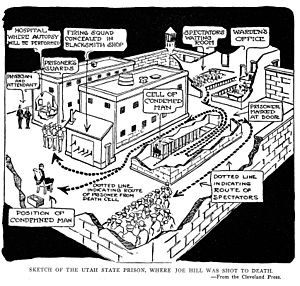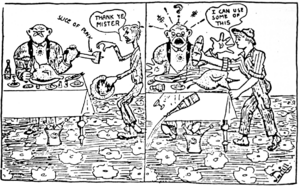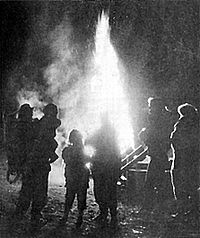Joe Hill (activist) facts for kids
Quick facts for kids
Joe Hill
|
|
|---|---|
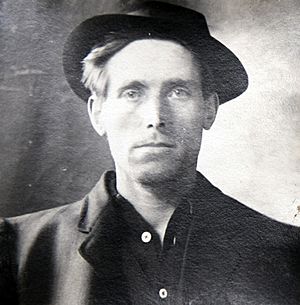
Joe Hill
|
|
| Born |
Joel Emmanuel Hägglund
October 7, 1879 Gävle, Sweden
|
| Died | November 19, 1915 (aged 36) Sugar House Prison, Salt Lake City, Utah, United States
|
| Cause of death | Execution by firing squad |
| Other names | Joseph Hillström |
| Occupation | Labor activist, songwriter, and member of the Industrial Workers of the World |
| Signature | |
 |
|
Joe Hill (born Joel Emmanuel Hägglund on October 7, 1879 – died November 19, 1915) was a Swedish-American activist and songwriter. He was a key member of the Industrial Workers of the World (IWW), also known as the "Wobblies."
Joe Hill moved to the United States from Sweden in the early 1900s. He worked many different jobs, often struggling to find steady work. He became famous for writing songs and drawing cartoons for the IWW union. His songs talked about the tough lives of workers and encouraged them to join together to improve their working conditions. Some of his most well-known songs include "The Preacher and the Slave" (where he created the famous phrase "pie in the sky"), "The Tramp", and "There Is Power in a Union".
Contents
Early Life and Journey to America
Joel Emmanuel Hägglund was born in 1879 in Gävle, Sweden. He was one of nine children in his family. His father worked on a railway line and passed away when Joe was young, which made things very difficult for the family.
The house where Joe Hill grew up in Gävle is still standing today. It is now a museum and a cultural center called the Joe Hill-gården.
When he was in his late teens and early twenties, Joel became very sick. In October 1902, when he was almost 23, Joel and his brother Paul moved to the United States. Joe became a traveling worker, moving from city to city across the country. He was in San Francisco during the big earthquake of 1906.
Joining the IWW
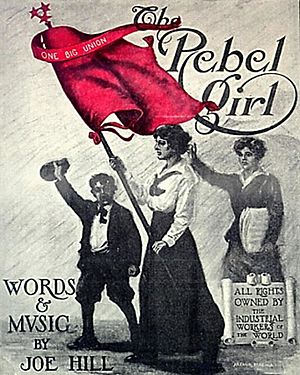
Around 1910, Joe started using the name Joe Hill or Joseph Hillstrom. He joined the Industrial Workers of the World (IWW), also known as the Wobblies, while working on the docks in San Pedro, California. He soon became an important part of the IWW.
Joe Hill traveled widely, helping to organize workers and giving speeches. He wrote many political songs and funny poems. He often used well-known tunes from popular songs and hymns for his own lyrics. His songs helped spread the IWW's message and encouraged workers to stand up for their rights.
The Trial and Execution
Joe Hill was a traveling worker, often riding freight trains to go from one job to another. By late 1913, he was working at a mine in Park City, Utah, near Salt Lake City.
In 1914, Joe Hill was accused of a crime in Salt Lake City. He was found guilty in a trial that many people found controversial. Even after appeals and calls for him to be set free from important people and worker groups around the world, Joe Hill was executed in November 1915. After his death, many folk songs, books, and poems were created to remember him.
New information found in 2011 suggested that Joe Hill might have had an alibi, meaning he could have proven he was somewhere else when the crime happened. This information was never used during his trial.
Joe Hill was executed on November 19, 1915, at Utah's Sugar House Prison.
Before his execution, Joe Hill wrote to Bill Haywood, a leader of the IWW. He famously said, "Goodbye Bill. I die like a true blue rebel. Don't waste any time in mourning. Organize ..." This phrase, "Don't mourn, organize!", became a powerful slogan for workers' rights.
Joe Hill also wrote his last will as a poem, which was later set to music:
My will is easy to decide
For there is nothing to divide
My kin don't need to fuss and moan
"Moss does not cling to rolling stone"
My body? Oh, if I could choose
I would to ashes it reduce
And let the merry breezes blow
My dust to where some flowers grow
Perhaps some fading flower then
Would come to life and bloom again.
This is my Last and final Will.
Good Luck to All of you
Joe Hill
After His Death
Joe Hill's body was sent to Chicago and cremated (turned into ashes). Following his wishes, his ashes were put into 600 small envelopes and sent around the world. The idea was for them to be released into the wind, symbolizing his spirit spreading everywhere.
One envelope of his ashes was found in 1988. It had been held by the U.S. Post Office since 1917 because it was considered "subversive" (meaning it might cause trouble). After some talks, these last ashes were given to the IWW. Many people suggested what to do with them. Some of the ashes were scattered in the wind in different countries, including the US, Canada, Sweden, and Australia. A small part was even buried in a union office wall in Sweden.
In 1989, some of Joe Hill's ashes were scattered at a ceremony in Colorado. This ceremony honored six unarmed IWW coal miners who had been killed in 1927.
Legacy and Influence
Joe Hill's words, "Don't waste any time mourning. Organize!", became a very popular slogan for people fighting for social change.
Many artists have honored Joe Hill through their work:
- A famous poem about him, "I Dreamed I Saw Joe Hill Last Night," was written by Alfred Hayes around 1930. This poem was later turned into a song by Earl Robinson.
- Many famous singers, like Paul Robeson, Pete Seeger, and Joan Baez, have performed the song "Joe Hill." Joan Baez's performance at Woodstock in 1969 is especially well-known.
- A Swedish leader named Ture Nerman wrote a book about Joe Hill's life and translated his songs into Swedish.
- Other musicians like Phil Ochs, Billy Bragg, and Chumbawamba have also written songs about Joe Hill.
- Authors Stephen and Tabitha King even named their son, Joseph Hillstrom King, after Joe Hill.
- A biography called Joe Hill by Gibbs M. Smith was made into a movie in 1971.
- In 1980, the Swedish postal service released a postage stamp honoring Joe Hill.
See also
 In Spanish: Joe Hill para niños
In Spanish: Joe Hill para niños
- Don't mourn, organize!
- List of worker deaths in United States labor disputes
Recordings of songs
Cover albums of his songs:
- Joe Glazer, Songs of Joe Hill, Smithsonian Folkways, 1954
- Bucky Halker, Anywhere But Utah: Songs of Joe Hill, Revolting Records, 2015
 | Emma Amos |
 | Edward Mitchell Bannister |
 | Larry D. Alexander |
 | Ernie Barnes |


